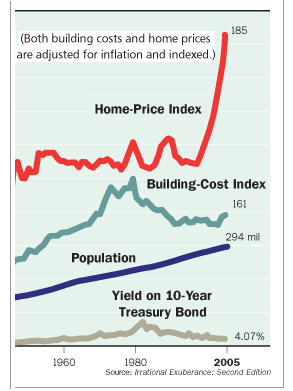

|
| weblog/wEssays | home | |
|
As the Real Estate Bubble Pops, so Does the Economy (March 14, 2006)  First, let's demolish the cliches people spout to justify the notion that today's
skyhigh real estate prices are permanent:
First, let's demolish the cliches people spout to justify the notion that today's
skyhigh real estate prices are permanent:
As described in yesterday's entry, this hopeful cliche also ignores what happens when adjustable-rate (alas, always a low "teaser rate" to start) mortgages rise (the harmless sounding "resets"), triggering foreclosures. The lenders can't wait five years for values to recover; they need to get the distressed properties off their books ASAP, regardless of their losses. 
"The market feels a lot like it did in March of 2000, right near the top," says Mr. McClintock of Babson. He doesn't expect a pullback nearly as severe as that one, but he has the same sense of excess market optimism at a time when the economy is slowing and bond yields are rising.In a nutshell: foreign buyers of U.S. debt (bonds) have artificially suppressed interest rates. Now, with rates around the world rising, the U.S. must raise interest rates in order to keep our bonds attractive to foreign investors--Asian central banks and Mideast nations flush with record oil profits. The inevitable conclusion: as bond rates rise, so do interest rates. As Interest rates rise, housing prices drop and foreclosures rise, putting more downward pressure on housing values. As housing values drop, American can no longer borrow their equity to spend, spend, spend. According to many sources (for example, Parade Magazine this past Sunday), American pulled out $880 billion from their home equity in 2005 alone. That accounts for about 7.5% of the entire U.S. economy, and about 10% of all consumer spending.  And what happens to the economy when Americans can no longer count on more debt
to support their lavish spendng? Recession.
And what happens to the economy when Americans can no longer count on more debt
to support their lavish spendng? Recession.
If you need some numbers, please read this piece from the Wall Street Journal: The Debt Bubble Threatens to Derail Many Baby Boomers' Retirement Plans Let's start with a shocking revelation: If you borrow money, it eventually has to be repaid. We all know this, of course. Yet the data suggest many Americans are trying their hardest to ignore this inconvenient fact.While this might be easily dismissed if it was from some wildly unfactual blog, this is from the august Wall Street Journal. How long can we as a nation dismiss the facts? For better or for worse, the markets will not dismiss the facts for much longer. The stock market is heading lower, predicting the coming "the real estate bubble has finally popped" recession. As housing weakens both in sales and prices, it feeds what is known as a negative feedback loop: the lower prices drop, the less people can borrow, and the debt machine grinds to a halt. As the cost of borrowing rises, people's spendable cash plummets, leaving them less to blow on consumer goods, further weakening the economy. In sum: the evidence is in, and it's compelling. Look out below. copyright © 2006 Charles Hugh Smith. All rights reserved in all media. I would be honored if you linked this wEssay to your site, or printed a copy for your own use. |
||
| weblog/wEssays | home |